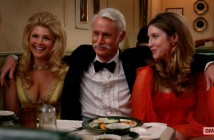April 5, 2015, 9:00 p.m. (EST), CBS
For the second time this season, The Good Wife is ripping from headlines it presciently anticipated, airing episodes shot months before events unfolded that seem to comment on these events, nearly directly. It’s a neat trick, and one Robert and Michelle King have taken pride in on both occasions (even putting a title card before “The Debate” to point out the episode’s shooting predated the Ferguson Grand Jury verdict), and yet, not one that has really paid much in the way of dramatic dividends for them. “The Debate” is an all-time awful episode of the series, one of the worst hours it has ever turned out. And while “Loser Edit” is nowhere near that dire, it also uses its “ripped from the headlines” issue as basically an after-thought, a way for R.D. to earn Diane’s respect, even as they vehemently disagree.
Before we get to that, let’s talk about Alicia’s storyline, where her affair with Will threatens to come out because the leaked emails are making their way to the press. When this plotline was teased in last week’s previews, it seemed a plausible way to raise tension in the final stretches, but here, it plays out mostly as political farce, as Eli and Josh run around trying to get ahead of the story and Mo Rocca shows up as an almost impossibly stupid journalist, the sort who would feel more at home on Perd Hapley’s show than within the world of The Good Wife. But, then, it turns out all of this was a stalling tactic for the real reveal, when the episode ends on allegations of vote tampering in Alicia’s race.
The problem with this “twist,” is that it comes out of nowhere, harkening back to Peter’s actual vote-tampering, but in a way that is completely unclear for the moment. We haven’t had a single hint that anything irregular happened in Alicia’s election until now, and it is not clear whether this is a convoluted plot to raise Peter’s problems again, or an actual threat to Alicia’s victory (and freedom). The show has a plotline with stakes and ties to the long history this series has built up over its run in the email leak, and instead is veering towards a remake of a controversy it already dealt with. The e-mail leak could have provided for actual drama, had these revelations been taken more seriously. But the show swats away questions of the effects of Will and Alicia’s affair on her credibility. It ignores the idea that this scandal for her could easily mirror the one that Peter dealt with in the show’s opening episodes. In a season full of mirrors to the show’s beginnings, this is an almost nonsensical failure to notice the potential parallels, and what they might say about “Saint Alicia” and her fitness for office.
Then there’s the Kalinda plotline, which sees the return of Wiley, perhaps because he is the only person still in the show’s orbit who can remotely match wits with Kalinda the magic clue ninja. Wiley is Kalinda’s Louis Canning, but where Canning is colorful and twirls his mustache just enough, Wiley is just a quietly competent father of young children trying to do his job. There should be a lot of tension in the moment where he tells Kalinda “You’re caught,” but at this point, I think the ship has sailed on me caring about Kalinda’s storyline even remotely. She’s on her way out, probably in a way that smacks of permanence and fingers crossed the wonderful Archie Panjabi finds a role that utilizes her considerable talents (and soon).
Then there is the Diane-RD plotline, which just has both characters spouting off rhetoric so broad that the debate between them never feels like more than a series of talking points. It feels like The Good Wife is so afraid to offend one side or the other, it forgets to give either side their actual argument to make. Instead, both people end up saying things that probably every viewer agrees with on some level. Diane “the law is personal” Lockhart and Reese “People should stand by their principles” Dipple aren’t saying anything everyone doesn’t agree with, to the point that their actual positions are distorted. Diane believes that businesses should not get religious exemptions to discriminate based on the beliefs of the people who own them. Reese believes that religious beliefs should attach to corporations as much as they attach to people, and that this sometimes means sanctioning discrimination to protect the sanctity of beliefs. These are very different positions, and the space between them is one that is worth engaging in. This isn’t an “issue” episode of The Good Wife. In fact, I am increasingly unsure that this show is capable of pulling one of those off. Rather, this is an episode that uses the flash of a touchy subject to draw people in for a story that is barely about the subject at all.
It is worth mentioning that “Loser Edit” has many of the same issues I discussed when I lambasted “The Debate.” Here, we watch rich, heterosexual white people debate an issue they show no real clear understanding of, until a token character appears to limply put a human face on the issue. It’s insulting to watch the show wheel out RD’s nephew (Michael Zegen) to give a little speech that, again, feels like something no one really could disagree with, and that obfuscates the issues this episode is nominally engaging with. It isn’t engaging. It is profiting off the idea of engagement, while taking no risks and remaining blissfully unaware of its failings. I didn’t find “Loser Edit” as offensive as “The Debate,” but it does show that The Good Wife is fully unaware of the privilege of its characters, and basically uninterested in the minority experience except as icing on top of its plot cake. Put in this light, the plight of Kalinda Sharma, a bisexual woman of color, becomes even more problematic. The Good Wife has forgotten Kalinda, and lost track of what to do with her. Perhaps Kalinda serves as a symbol for a much larger problem lurking behind the scenes of this series, and beneath the surface of its episodes.
There are good moments in “Loser Edit,” most specifically the lovely scene between Peter and Alicia where they seem to set aside their differences and see each other as people again. They both seem to realize that they used to love each other, and perhaps more importantly, that they used to like each other. Behind all the bluster, underneath all the mistakes and betrayals and anger, maybe they still do. It’s a moment that trades on these characters’ shared history, feels steeped in what’s come before, and yet is not remotely a retread. It is good, character-based drama in an episode and a season that is increasingly devoid of what used to be the show’s bread and butter. The Good Wife isn’t good at issues. It’s good at watching people sort through complex emotions in high stakes situations and try to figure out who they are and who they’d like to be. It’s good when Alicia Florrick has to pause and wonder whether she’ll make that next compromise or take that next stand. It’s good when it remembers these are all ambiguous people in ambiguous situations in an ambiguous world they still have to live in. I want The Good Wife to be good again. I can only hope it remembers how.
The Roundup
- “People don’t like when you tear down their heroes.” “Are you kidding? It’s what they live for.”
- “Do you have any ideas?” “No.”
- “Actually, its kind of nice sitting here drinking together. It’s like watching two other people drink.” “And what do those two other people do?” “They used to be married. They like each other. They forgot that they’re supposed to hate each other.”
- “You’re like an eighteen year old. Everything is about where you can stick it!”
- “Love is a word that is so exhausted. I wish it meant something to me.”
- “Do I need to contain this?” “That’s an understatement.”
- “I like secrets and things of that elk.” “Ilk?” “No. Elk.”
- “The law is supposed to be fair, not impersonal. In fact, I would argue the law is always personal. It has to see the human side too, or else its meaningless.”
The Good Wife is fully unaware of the privilege of its characters, and basically uninterested in the minority experience except as icing on top of its plot cake.
-
OKAY




